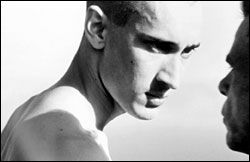IN HER AUSPICIOUS 1988 debut film, Chocolat, Claire Denis dealt dreamily and deliberately with the legacy of colonialism. Since then, her films have been full of figures who also flit about the colonial frontier. Appropriate to the Grand Illusion’s four-film, two-week salute to her career, No Fear, No Die (1990) follows two black immigrants through the back alleys and truck stops of hardscrabble France. They lead an itinerant existence training fighting cocks and settle, for a time, in the basement of a restaurateur who holds illegal cockfights in his nearby club. Ever-cool narrator Dah (Isaach De Bankol驠is from Benin and near-silent Jocelyn (Alex Descas, a Denis regular) from the West Indies; together they’re a team that feeds, primps, and massages their roosters with Rocky-like devotion. (At one point, Jocelyn even dances with one prize bird to Bob Marley’s “Buffalo Soldiers,” which Dah says is taking things too far.)
“Man, cocks, same thing,” Dah observes laconically; they’re both fighting for their lives, fighting to make a buck. It’s as close to a thematic statement as Denis will permit in this slow, somber little drama. No Fear starts kind of noirish and culminates in a killing (one blood sport leads to another, you see), but Denis steadfastly resists any kind of obvious dramatic conflict. Jocelyn pines for the restaurateur’s wife (Wings of Desire‘s Solveig Dommartin), but nothing really comes of it. As a result, No Fear is often downright dull (how much chicken handling can a viewer endure?), but it’s strong on pent-up foreboding, mood, and atmosphere. Story is secondaryor even tertiary, at best.
Even more abstract is Denis’ 1999 Beau Travail (which runs with No Fear Friday, April 25 through Thursday, May 1). It played here three years ago, and I’m still pretty cool on this loose, loose adaptation of Melville’s Billy Budd. Instead of a sailing ship, we have a remote French Foreign Legion outpost in Djibouti. Instead of a Christ figure (Gr駯ire Colin) crucified by a hate-filled brute, we have a more sympathetic narrator (Denis Lavant) who’s responsible yet somehow repentant for the hero’s fate.
Again, story doesn’t matter much. Denis is mainly interested in the soldiers’ austere, regimented, and thoroughly physical life. They perform group calisthenics in the hot sun, contorting their bodies in unison, casting Giacometti shadows on the burning sands. (These sessions resemble nothing so much as Leni Riefenstahl’s 1936 Olympics documentary Olympia.) Travail is a willfully opaque and evocative picture, haunting and incompleteyet powerful for its gaps and silences. (Denis is big on gaps and silences.) The desert air seems suffused with tragedy, but Denis resists even that obvious plot avenue, using disco and even Neil Young’s “Safeway Cart” to score an inconclusive tale of rivalry and regret.
Claire Denis will conduct a Q&A following a screening of her newest film, Friday Night (which opens in August), at Seattle Art Museum, 100 University St., 206-625-8900; 7 p.m. Fri., April 25. Tickets: $10-$12, available in advance at Scarecrow Video, Grand Illusion Cinema, and Little Theatre.








